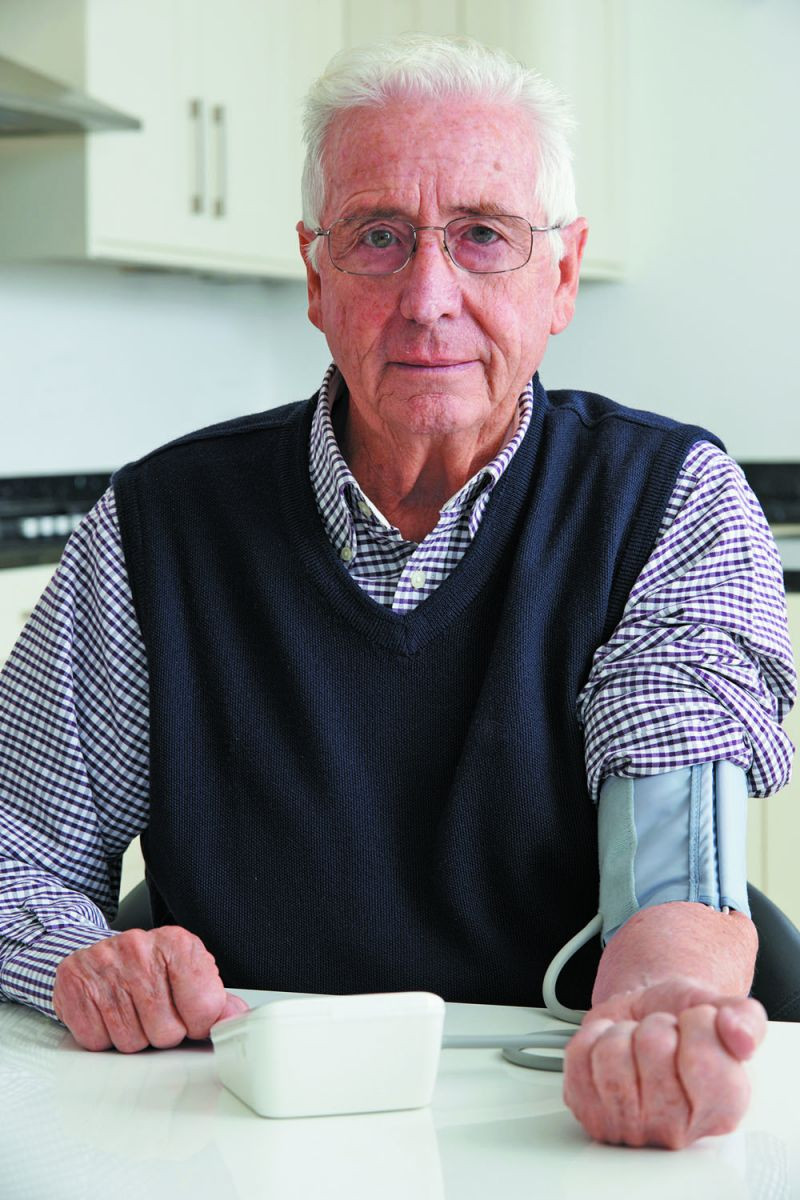
Tips to leverage neuroplasticity to maintain cognitive fitness as you age

Can white noise really help you sleep better?

Celiac disease: Exploring four myths

What is prostatitis and how is it treated?

What is Cushing syndrome?

Exercises to relieve joint pain

Think your child has ADHD? What your pediatrician can do

Foam roller: Could you benefit from this massage tool?

Stepping up activity if winter slowed you down

Common causes of cloudy urine
Medical Tests & Procedures Archive
Articles
Rapid urine test could reduce unnecessary antibiotic use
Research we're watching
Image: © moodboard/Thinkstock
A new test might help doctors better treat patients with urinary tract infections, according to a study published in the Oct. 4, 2017, issue of Science Translational Medicine. These infections prompt some eight million doctor visits each year, and doctors often prescribe antibiotics to treat the condition. However, sometimes the bacteria they are attempting to treat are resistant to first-line antibiotics. The delay caused by the ineffective medication can, in some cases, cause the patient's condition to worsen and lead to complications. To eliminate this antibiotic guesswork, researchers developed a new quick-acting antimicrobial susceptibility test that not only tells the doctor within 30 minutes whether the patient has a urinary tract infection, but also what type of bacteria caused it and what drugs will best treat it. The test can also quickly identify cases where antibiotics aren't needed at all, preventing overuse of antibiotics, which can promote resistance. The same type of rapid testing, might eventually be of use in identifying the best anti-biotics for other types of bacterial infections as well.
The Couric-Jolie effect: When celebrities share their medical experiences
Celebrities can certainly help raise awareness of health issues, but these stories can't replace medical advice based on your personal situation.
People at low risk for heart trouble may not need routine ECGs
In the journals
A study published in the September 2017 issue of JAMA Internal Medicine found that doctors may prescribe an electrocardiogram (ECG) as part of an annual health examination even for people at low risk for heart disease. The study looked at about 3.6 million people with no history of heart problems, like heart attack, high blood pressure, or diabetes, who had at least one routine exam over a five-year period. Of these people, 21.5% had an ECG within 30 days after their exam.
The researchers found that those who got the ECG were five times more likely to get further cardiology testing that not only increased out-of-pocket costs, but also raised their risks of radiation exposure and complications from additional procedures. The addition of an ECG did not appear to offer additional benefits, as the rates of death, heart-related hospitalizations, and bypass surgery were equally low in both the ECG and non-ECG groups at the one-year follow-up.
Choosing and using a home blood pressure monitor
These devices help you keep tabs on a key indicator of your cardiovascular health.
Of all the things you measure to assess your health, blood pressure certainly ranks among the most important. High blood pressure not only puts you at risk for a heart attack or a stroke, but also can damage your brain, eyes, and kidneys.
For some people with this common condition, checking blood pressure intermittently at the doctor's office may not be enough. Investing in a simple, inexpensive home blood pressure monitor often makes sense. It's especially helpful when you're starting a new medication or are taking several different ones and still working to reach your blood pressure goal.
When you look for cancer, you might find heart disease
Screening for lung and breast cancer may reveal information about the health of your heart's arteries.
Image: © Jupiterimages/Thinkstock
Screening tests for two of the most common forms of cancer involve detailed x-ray images of the chest. Growing evidence suggests that these tests — chest computed tomography (CT) scans and mammograms — may also offer clues about a person's risk of heart disease.
"Both doctors and their patients should be aware that the low-dose CT scans used to find lung cancer can also detect plaque in the arteries of the heart," says Dr. Ron Blankstein, a cardiovascular imaging specialist and preventive cardiologist at Harvard-affiliated Brigham and Women's Hospital. CT scans take a series of rapid-fire x-rays in seconds. Combined, the images allow doctors to "see" structures inside the body.
Where to turn for low back pain relief
In most cases, a primary care doctor or chiropractor can help you resolve the problem.
Low back pain is one of the most common complaints on the planet. And you may wonder where to turn when you start experiencing some of those aches or twinges in the lower part of your back. Take heart. "In most cases, you won't need a specialist," says Dr. Robert Shmerling, a rheumatologist at Harvard-affiliated Beth Israel Deaconess Medical Center.
When pain strikes
There are many causes of low back pain. Some of the most common include an injury to a muscle or tendon (a strain), an injury to a back ligament (a sprain), and a herniated or "slipped" disc (when the soft material inside of a disc between spinal bones leaks and irritates nerves). Many of these issues will eventually resolve on their own.
What is a “full metal jacket”?
Ask the doctor
Image: © MileA/Thinkstock
Q. I heard my cardiologist say to another doctor that I have a "full metal jacket." What does that mean?
A. Cardiologists use the term "full metal jacket" to refer to a long series of stents in one of the heart's three major arteries. Stents are tiny metal cylinders, often with drug coatings, that help prop open arteries to restore blood flow to the heart. They're placed inside arteries during an angioplasty, in which a doctor snakes a thin, flexible tube (catheter) through the blood vessels to a narrowed section. A deflated balloon at the tip of the catheter then inflates, pushing fatty plaque against the artery wall and expanding the stent.
Should you stop anti-clotting drugs before a procedure?
Because many factors are involved, make sure your doctors talk to each other if you need an invasive test or procedure.
Image: © thodonal/Thinkstock
Millions of people with cardiovascular disease take drugs that help prevent blood clots, which can lodge in a vessel and choke off part of the blood supply to a leg, a lung, or the brain. These potentially lifesaving medications, known generally as anticoagulants, include warfarin (Coumadin) and a class of drugs called non–vitamin K antagonist oral anticoagulants, or NOACs (see "Anti-clotting drugs: The old and the new").
However, if you're taking one of these drugs and need an invasive procedure — anything from a tooth extraction to a hip replacement — managing the risks can be tricky, says cardiologist Dr. Gregory Piazza, assistant professor of medicine at Harvard Medical School. "There's a higher-than-normal risk of bleeding during and after the procedure, because your blood doesn't clot as easily," he says.
Laser procedure a possible treatment for eye floaters
In the journals
A common laser treatment may help people with a specific type of eye floater, according to a small study published online July 20, 2017, by JAMA Ophthalmology. Floaters are spots in your vision like black or gray specks, strings, flying bugs, or cobwebs. They become more prevalent with age and occur when the jelly-like substance inside the eyes becomes more liquid, shrinks, and separates from the back wall of the eye.
There are three treatments for floaters: observation, where a floater is monitored for changes (for instance, if it moves away from your central vision or the brain adapts and ignores it); vitrectomy surgery to remove the floater; and YAG vitreolysis, which vaporizes the floater with a laser.
Should you try a home genetic test kit?
A direct-to-consumer test can uncover risks for developing some diseases. But will it help you improve your health?
Image: © pe-art/Thinkstock
What if you could take a test at home to predict your risk of getting certain diseases, like Alzheimer's or Parkinson's? It's a question you may face now that the FDA has given the green light to third-party direct-to-consumer (DTC) test kits that look for genetic risk information.
"Increasingly, people want to explore their own medical data," says Dr. Robert Green, a Harvard Medical School professor and geneticist at Harvard-affiliated Brigham and Women's Hospital, who studies the medical, behavioral, and economic outcomes associated with genomic medicine (for more about his work, visit www.genomes2people.org).

Tips to leverage neuroplasticity to maintain cognitive fitness as you age

Can white noise really help you sleep better?

Celiac disease: Exploring four myths

What is prostatitis and how is it treated?

What is Cushing syndrome?

Exercises to relieve joint pain

Think your child has ADHD? What your pediatrician can do

Foam roller: Could you benefit from this massage tool?

Stepping up activity if winter slowed you down

Common causes of cloudy urine
Free Healthbeat Signup
Get the latest in health news delivered to your inbox!
Sign Up










